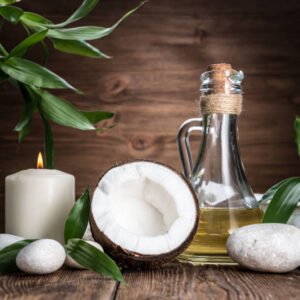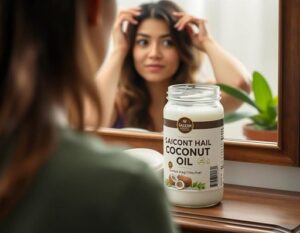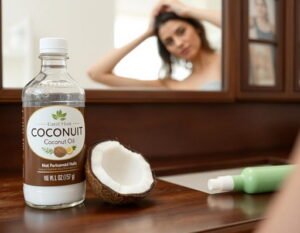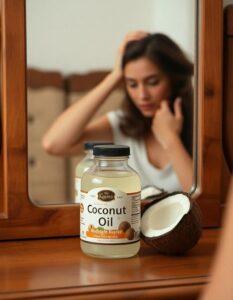
Coconut oil has gained popularity as a versatile natural remedy for hair care. Packed with essential nutrients and unique fatty acids, this tropical oil offers a range of benefits for maintaining healthy and lustrous hair. In this article, we explore the science behind the benefits of coconut oil for hair care, backed by research and expert insights.
Deep Conditioning and Moisturizing
Coconut oil stands out as a powerful deep conditioning agent, renowned for its exceptional moisturizing capabilities. The secret lies in its high concentration of medium-chain fatty acids, particularly lauric acid, which is known for its ability to penetrate deep into the hair shaft. Unlike many other oils that simply coat the hair, coconut oil is absorbed by the hair fibers, nourishing them from the inside out.When applied regularly, coconut oil helps to retain moisture within the hair, preventing dryness and brittleness that can lead to breakage. This deep conditioning effect not only hydrates the hair but also creates a protective barrier that shields it from environmental damage, such as heat styling and pollution. The ability of coconut oil to reduce protein loss in both damaged and undamaged hair further underscores its role in maintaining healthy, strong, and resilient hair.Additionally, coconut oil’s moisturizing properties make it an ideal treatment for frizzy hair, helping to smooth the hair cuticle and enhance its natural shine. Over time, consistent use of coconut oil as a deep conditioner can result in softer, more manageable hair that is less prone to tangling and splitting.
 Protection against Damage
Protection against Damage
Coconut oil’s unique molecular structure enables it to penetrate deeply into the hair shaft, creating a robust protective barrier that shields hair from various damaging environmental factors. This protective layer helps guard against the harmful effects of UV radiation, which can weaken and degrade hair over time, leading to dryness, brittleness, and color fading. Additionally, coconut oil’s barrier effect minimizes the impact of heat styling tools, such as hair dryers, straighteners, and curling irons, which can cause significant thermal damage to the hair cuticle.Scientific studies have shown that coconut oil is particularly effective at reducing protein loss in the hair, which is crucial for maintaining its strength and elasticity. By preserving the hair’s natural proteins, coconut oil not only helps to prevent breakage and split ends but also enhances the hair’s overall resilience. Furthermore, regular use of coconut oil can protect the hair during common grooming practices like combing and brushing, which often lead to mechanical damage when the hair is weak or dry.The oil’s ability to lock in moisture and maintain the hair’s natural lipid content further contributes to its protective qualities. This hydration helps to keep the hair smooth, soft, and less prone to tangling, which in turn reduces the likelihood of damage from everyday wear and tear. As a result, coconut oil serves as a comprehensive protective agent that not only defends against immediate environmental threats but also supports long-term hair health by maintaining its integrity and vitality.
 Antimicrobial and Anti-inflammatory Effects
Antimicrobial and Anti-inflammatory Effects
Coconut oil is renowned for its powerful antimicrobial and anti-inflammatory properties, which play a crucial role in promoting a healthy scalp. These properties make it particularly effective in addressing common scalp conditions such as dandruff, fungal infections, and various forms of scalp inflammation.The antimicrobial activity of coconut oil is primarily attributed to its high lauric acid content, which constitutes nearly 50% of the oil’s composition. Lauric acid has been shown to have potent antibacterial, antiviral, and antifungal properties, making it a versatile agent in combating a wide range of pathogens. When applied to the scalp, coconut oil creates a hostile environment for bacteria and fungi, thereby reducing the likelihood of infections that can lead to irritation and discomfort.In addition to its antimicrobial effects, coconut oil’s anti-inflammatory properties are highly beneficial in soothing an inflamed scalp. Chronic scalp inflammation can lead to symptoms such as redness, itching, and flakiness, which are often exacerbated by underlying infections. Coconut oil helps to alleviate these symptoms by reducing inflammation at the cellular level. It does so by inhibiting the production of pro-inflammatory cytokines and other inflammatory mediators, thereby providing relief from irritation and promoting healing.
 Stimulating Hair Growth
Stimulating Hair Growth
While direct scientific evidence linking coconut oil to accelerated hair growth is still limited, its beneficial properties for the scalp and hair structure create a favorable environment for optimal hair growth. Coconut oil is rich in fatty acids, particularly lauric acid, which has the ability to penetrate deep into the hair shaft, nourishing the hair from within. This deep conditioning effect not only strengthens the hair but also helps to prevent protein loss, which is essential for maintaining healthy, resilient hair that is less prone to breakage.Moreover, a healthy scalp is crucial for hair growth, and coconut oil excels in this area by providing antimicrobial and anti-inflammatory properties. It helps to combat scalp conditions such as dandruff and fungal infections, which can hinder hair growth by clogging hair follicles or causing irritation. By keeping the scalp clean and moisturized, coconut oil ensures that hair follicles remain unblocked and healthy, thereby supporting the natural hair growth process.In addition to its scalp-soothing effects, coconut oil’s ability to seal moisture into the hair shaft reduces the likelihood of dryness and split ends. This not only preserves the length of the hair but also contributes to the appearance of fuller, thicker hair over time. When used regularly, coconut oil can help protect the hair from environmental damage, such as exposure to UV rays and pollution, which can weaken hair and slow down growth.
 Enhancing Hair Appearance and Texture
Enhancing Hair Appearance and Texture
Regular use of coconut oil can significantly enhance the appearance and texture of your hair, transforming it into a smoother, shinier, and healthier-looking version of itself. The rich, nourishing properties of coconut oil penetrate deep into the hair shaft, delivering essential nutrients that help repair and rejuvenate damaged hair. By locking in moisture, coconut oil effectively combats dryness, which is often a leading cause of frizz and dullness.In addition to its hydrating effects, coconut oil also works as a natural conditioner, smoothing the hair cuticles and reducing the appearance of split ends. This results in hair that feels softer and is easier to manage, allowing for a more polished and refined look. The oil’s ability to enhance the hair’s natural shine further contributes to an overall radiant appearance, making your hair look vibrant and full of life.Coconut oil’s lightweight texture ensures that it doesn’t weigh down your hair, making it suitable for all hair types, from fine to thick. Regular application can help improve the hair’s elasticity, reducing breakage and making it more resilient against environmental damage. Over time, consistent use of coconut oil can lead to visibly healthier hair with enhanced texture, providing a sleek and lustrous finish that is both beautiful and easy to maintain.
Using Coconut Oil for Hair Protection: A Guide and DIY Recipe
We will explore how to effectively use coconut oil to protect your hair from damage caused by various environmental factors. Additionally, we will provide a simple DIY recipe for a coconut oil hair treatment that you can easily prepare at home.
 How to Use Coconut Oil for Hair Protection:
How to Use Coconut Oil for Hair Protection:
Before shampooing, apply a generous amount of coconut oil to your hair, focusing on the ends and areas prone to dryness or damage. Gently massage the oil into your scalp and hair, ensuring even distribution. Leave it on for at least 30 minutes or overnight for a deep conditioning treatment. The coconut oil acts as a protective barrier, preventing moisture loss during the shampooing process.In addition to its protective benefits, using coconut oil as a pre-shampoo treatment can also help detangle your hair, making it easier to manage and style afterward. The oil’s lubricating properties reduce friction between hair strands, which in turn minimizes breakage and split ends during washing. This pre-treatment can be especially beneficial for those with curly, thick, or textured hair, as it helps maintain the hair’s natural structure and prevents it from becoming overly dry and brittle during cleansing.
When using heat styling tools such as hairdryers, straighteners, or curling irons, apply a small amount of coconut oil to your hair. The oil forms a protective layer that helps minimize heat damage and retain moisture. Remember to use heat styling tools on low to medium heat settings to further reduce the risk of damage.Beyond just protecting your hair from heat, coconut oil also helps in enhancing the effectiveness of your styling tools. By sealing in moisture, it allows for smoother, more uniform heat distribution across your hair, resulting in better styling results. Moreover, the natural fatty acids in coconut oil can strengthen hair strands, making them more resilient to the stress of heat styling. This not only protects your hair from immediate damage but also contributes to long-term hair health, ensuring that your locks remain strong and shiny even with regular heat styling.
Before exposing your hair to the sun, apply coconut oil as a natural sunscreen. Coconut oil offers a low level of sun protection and can help prevent UV damage to your hair. Massage a small amount of oil onto your hair, focusing on the areas exposed to the sun, and reapply as needed.In addition to shielding your hair from UV rays, coconut oil also helps protect your hair color from fading due to sun exposure. Whether your hair is natural or color-treated, prolonged exposure to the sun can cause your hair to lose its vibrancy and shine. The antioxidants in coconut oil help combat the oxidative stress caused by UV rays, preserving your hair’s natural color and luster. For those who spend a lot of time outdoors, incorporating coconut oil into your hair care routine can be a simple yet effective way to maintain healthy, vibrant hair despite the sun’s harsh effects.
- Frizz Control and Shine Enhancer:
To tame frizz and add shine, take a pea-sized amount of coconut oil, rub it between your palms, and then lightly run your hands over your hair. Avoid applying too much oil, as it can make your hair appear greasy. This method helps smooth down the hair cuticles, reducing frizz and enhancing shine.Beyond its immediate effects on frizz and shine, regular use of coconut oil for this purpose can lead to cumulative benefits over time. By consistently smoothing the hair cuticles, coconut oil helps in reducing the roughness and uneven texture that often contributes to frizz. This makes your hair more manageable and easier to style on a day-to-day basis. Additionally, the oil’s moisturizing properties work to prevent future frizz by keeping your hair hydrated and supple, especially in humid or dry environments. Over time, you’ll notice that your hair not only looks shinier but also feels softer and healthier with each application.
DIY Coconut Oil Hair Treatment Recipe:
Ingredients:
- 2 tablespoons of organic coconut oil: Coconut oil is the star ingredient of this treatment, known for its deep conditioning and nourishing properties. It contains lauric acid, which has a unique ability to penetrate the hair shaft, helping to strengthen and protect the hair from within.
- 1 tablespoon of honey (optional, for additional moisture): Honey is a natural humectant, meaning it helps attract and retain moisture. It also has antibacterial properties that can contribute to a healthy scalp. Adding honey to the treatment enhances its moisturizing effects, making it ideal for dry or damaged hair.
- 5-10 drops of essential oil (such as lavender or rosemary) for a pleasant fragrance (optional): Essential oils not only add a lovely scent to the treatment but also offer various benefits depending on the type used. Lavender essential oil is known for its calming properties and can help soothe the scalp, while rosemary essential oil is often used to stimulate hair growth and improve circulation to the scalp.
Instructions:
- Melt the coconut oil in a microwave-safe bowl for a few seconds until it becomes a liquid: Coconut oil solidifies at room temperature, so gently warming it will make it easier to mix with the other ingredients and apply to your hair. Be careful not to overheat it; a few seconds in the microwave or in a warm water bath should be sufficient.
- If desired, add the honey and essential oil to the melted coconut oil and mix well: Adding honey will give the treatment an extra boost of hydration, while the essential oils can provide both a pleasant aroma and additional hair benefits. Mix the ingredients thoroughly to ensure an even consistency.
- Allow the mixture to cool slightly but ensure it remains in liquid form: It’s important that the mixture is not too hot when applied to your hair, as it could potentially cause discomfort or even damage. Let it cool down just enough to be comfortable to the touch, but still liquid enough to spread easily.
- Apply the mixture to dry or damp hair, starting from the roots and working your way to the ends: Applying the treatment to dry hair allows the oil to better penetrate the hair shaft, while applying it to damp hair can help lock in moisture. Start at the roots and massage the mixture through to the ends, ensuring every strand is coated.
- Massage the mixture into your scalp and hair, ensuring even coverage: Massaging the scalp stimulates blood circulation, which can promote hair growth and improve scalp health. Spend a few minutes massaging the treatment into your scalp to fully reap these benefits.
- Leave the treatment on for 30 minutes to an hour: This allows the coconut oil and other ingredients to deeply penetrate and nourish your hair. For a more intensive treatment, you can leave it on overnight—just be sure to cover your hair with a shower cap or towel to protect your bedding.
- Rinse your hair thoroughly with lukewarm water, followed by your regular shampoo and conditioner: Use lukewarm water to rinse out the oil, as hot water can strip away natural oils and cold water might not effectively remove the treatment. Follow up with your usual shampoo and conditioner to ensure your hair is completely clean and to lock in moisture.
Additional Tips and Tricks:
- Use a wide-tooth comb: After applying the coconut oil treatment, use a wide-tooth comb to gently detangle your hair. This helps distribute the oil evenly and prevents breakage.
- Add heat for deeper penetration: To enhance the treatment’s effectiveness, wrap your hair in a warm towel or use a shower cap to trap heat, allowing the oil to penetrate more deeply into the hair shaft.
- Adjust the amount for your hair type: If you have fine or thin hair, use a smaller amount of coconut oil to avoid weighing your hair down. For thick or curly hair, you may need to use more to ensure full coverage.
- Incorporate this treatment regularly: For optimal results, use this coconut oil hair treatment once a week. Regular use will help maintain the health of your hair, keeping it hydrated, soft, and less prone to damage.
- Double up as a scalp treatment: If you have a dry or flaky scalp, this treatment can also double as a nourishing scalp mask. Massage the oil mixture into your scalp and leave it on for a longer period (or overnight) to deeply moisturize and soothe the skin.
- Experiment with different essential oils: Depending on your hair’s needs, try different essential oils. Tea tree oil, for example, is great for treating dandruff, while peppermint oil can help invigorate the scalp and promote hair growth.
Contraindications for using coconut oil:
- Coconut Allergy: If you have a coconut allergy, using coconut oil may cause allergic reactions such as itching, rashes, or difficulty breathing. It is important to perform a patch test on a small area of skin before using coconut oil to check for any allergic reactions.
- Comedogenicity: Coconut oil has a moderate comedogenic rating, which means it can potentially clog pores for some individuals, especially when used on the face. If you have a tendency to develop clogged pores or experience issues with comedogenic acne, you may want to avoid using coconut oil on the face or use it with caution.
- Oily Hair: For individuals with oily hair, coconut oil can be too heavy or exacerbate the oily appearance. If you have oily hair, you may want to use coconut oil only on dry hair or avoid it altogether.
- Skin Sensitivity: Each person has different skin sensitivity, and some individuals may be more sensitive to coconut oil than others. If you notice any irritation, redness, itching, or discomfort after using coconut oil, discontinue use and consult a skincare specialist.
- Interactions with Other Products or Medications: Before using coconut oil in combination with other products or medications, it is recommended to consult a doctor or pharmacist to avoid potential negative interactions.
It is always advisable to perform a patch test on a small area of skin before using coconut oil and consult a skincare specialist or doctor if you have any specific concerns or pre-existing conditions.
Conclusion:
The scientific evidence highlights the numerous benefits of coconut oil for hair care. From deep conditioning and moisturizing to protection against damage and promoting scalp health, coconut oil is a versatile natural remedy that can contribute to maintaining healthy and beautiful hair. By incorporating coconut oil into your hair care routine, you can harness its powerful properties and enjoy the transformative effects it offers.Click here if you want to see more articles from the
beauty category.Reference
- Rele, A. S., & Mohile, R. B. (2003). Effect of mineral oil, sunflower oil, and coconut oil on prevention of hair damage. Journal of Cosmetic Science, 54(2), 175-192.
- Nevin, K. G., & Rajamohan, T. (2010). Effect of topical application of virgin coconut oil on skin components and antioxidant status during dermal wound healing in young rats. Skin Pharmacology and Physiology, 23(6), 290-297.
- Agero, A. L., & Verallo-Rowell, V. M. (2004). A randomized double-blind controlled trial comparing extra virgin coconut oil with mineral oil as a moisturizer for mild to moderate xerosis. Dermatitis, 15(3), 109-116.
- Ogbolu, D. O., Oni, A. A., Daini, O. A., & Oloko, A. P. (2007). In vitro antimicrobial properties of coconut oil on Candida species in Ibadan, Nigeria. Journal of Medicinal Food, 10(2), 384-387.
 Coconut oil has gained popularity as a versatile natural remedy for hair care. Packed with essential nutrients and unique fatty acids, this tropical oil offers a range of benefits for maintaining healthy and lustrous hair. In this article, we explore the science behind the benefits of coconut oil for hair care, backed by research and expert insights.
Coconut oil has gained popularity as a versatile natural remedy for hair care. Packed with essential nutrients and unique fatty acids, this tropical oil offers a range of benefits for maintaining healthy and lustrous hair. In this article, we explore the science behind the benefits of coconut oil for hair care, backed by research and expert insights. Protection against Damage
Protection against Damage Antimicrobial and Anti-inflammatory Effects
Antimicrobial and Anti-inflammatory Effects Stimulating Hair Growth
Stimulating Hair Growth Enhancing Hair Appearance and Texture
Enhancing Hair Appearance and Texture How to Use Coconut Oil for Hair Protection:
How to Use Coconut Oil for Hair Protection:
 Protection against Damage
Protection against Damage Antimicrobial and Anti-inflammatory Effects
Antimicrobial and Anti-inflammatory Effects Stimulating Hair Growth
Stimulating Hair Growth Enhancing Hair Appearance and Texture
Enhancing Hair Appearance and Texture How to Use Coconut Oil for Hair Protection:
How to Use Coconut Oil for Hair Protection: